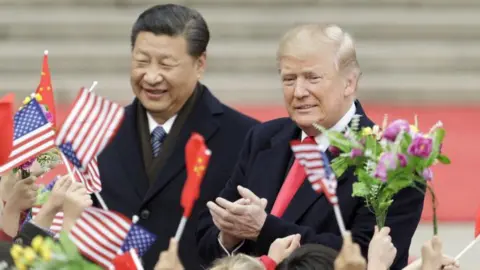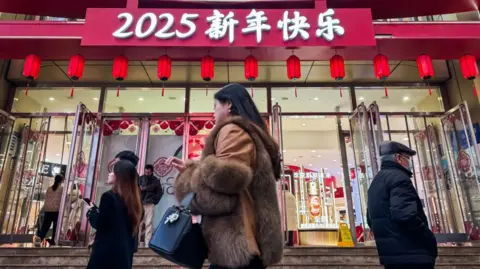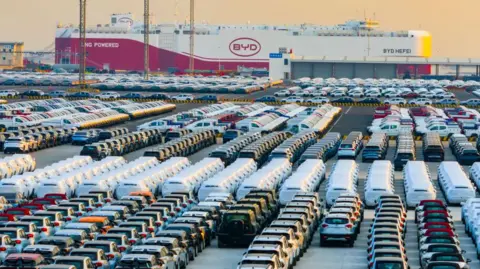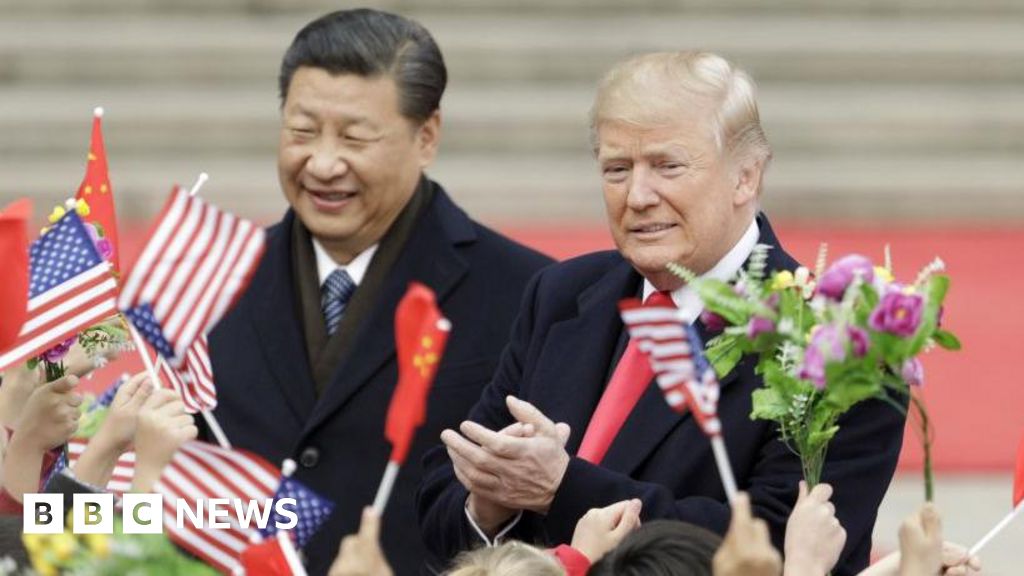 Getty Images
Getty ImagesChina’s economy recovered in the last three months of last year, allowing the government to meet its 5% growth target in 2024, the Chinese government said on Friday.
But the growth rate is one of the slowest in decades as the world’s second-largest economy struggles to overcome a protracted real estate crisis, high local government debt and youth unemployment. are.
The country’s statistics chief said China’s economic performance in 2024 was “hard-won” after the government rolled out a number of stimulus measures late last year.
The Chinese government has rarely met its growth targets in the past.
Experts had roughly predicted this growth rate. The World Bank said China could achieve annual growth of 4.9% due to lower borrowing costs and increased exports.
But investors are braced for the looming threat of additional tariffs on $500bn (£409bn) worth of Chinese goods from President-elect Donald Trump.
But that’s not the only thing holding back China from meeting next year’s growth goals.
Business confidence and consumer confidence are low, and the Chinese yuan will continue to weaken as the Chinese government cuts interest rates to boost growth.
There are three reasons why President Xi faces a bigger challenge than President Trump’s tariffs.
1. Tariffs are already hurting China’s exports
There are growing voices warning that China’s economy will slow down in 2025. Exports, one of the main drivers of last year’s growth, are now at risk.
China is relying on manufacturing to pull it out of the economic slowdown, exporting record numbers of electric cars, 3D printers and industrial robots.
The United States, Canada and the European Union have accused China of producing too many products and have imposed tariffs on Chinese imports to protect domestic jobs and businesses.
Experts say Chinese exporters may now focus on other regions of the world. However, these countries are likely to be located in emerging markets where demand is not as high as in North America or Europe.
This could impact Chinese companies looking to expand, which in turn could hurt energy and raw material suppliers.
Mr. Xi wants to transform China from the world’s factory of cheap goods into a high-tech powerhouse by 2035, but how will manufacturing remain a major growth engine in the face of rising tariffs? It is unclear whether this will be possible.
2. People just aren’t spending enough.
In China, a large portion of household wealth is invested in the real estate market. Before the real estate crisis, it accounted for nearly a third of China’s economy and employed millions of people, from builders and developers to cement producers and interior designers.
The Chinese government has implemented a number of policies to stabilize the real estate market, and the China Securities Regulatory Commission (CSRC), the financial market watchdog, has vowed to vigorously support reforms.
However, there are still too many vacant homes and commercial properties, and the oversupply continues to drive down prices.
 Getty Images
Getty ImagesThe downturn in the real estate market is expected to bottom out this year, but Wall Street banking giant Goldman Sachs says it will be a “multiyear drag” on China’s economic growth.
Consumption has already been hit hard, with household spending contributing just 29% of China’s economic activity in the last three months of 2024, down from 59% before the pandemic.
That is one of the reasons why the Chinese government is increasing exports. It wants to make up for weak domestic spending on new cars, luxury goods and just about everything else.
The government has also introduced programs such as consumer goods trade-in, which allows people to exchange washing machines, microwaves and rice cookers.
But experts question whether these measures alone are enough without addressing deeper problems in the economy.
They say people will need to have more money in their pockets before things return to pre-COVID levels.
“China needs to regain the animal spirit of its people, and we are still far from there,” said Shuang Ding, chief economist for Greater China and North Asia at Standard Chartered Bank.
“If the private sector starts investing and innovating, income and employment prospects will increase and people will be able to spend more confidently.”
High public debt and unemployment are also impacting savings and spending.
Official figures show youth unemployment remains higher than before the pandemic, suggesting wage growth is stagnant.
3. Businesses aren’t flocking to China like they used to.
President Xi has promised to invest in cutting-edge industries, which the government calls “new productive capacity.”
In the past, this has enabled China to become a leader in areas such as renewable energy products such as solar panels and electric car batteries.
Last year, China also overtook Japan to become the world’s largest car exporter.
 Getty Images
Getty ImagesBut lackluster economic conditions, uncertainty over tariffs and other geopolitical uncertainties are discouraging foreign companies from investing in China.
Stephanie Leung of wealth management platform StashAway points out that this is not a problem with foreign or domestic investment, but rather that companies don’t see a bright future.
“They want more diverse investors to come in.”
For all these reasons, experts believe that economic support measures will only partially cushion the impact of potential new US tariffs.
Hui Xiang, Goldman Sachs’ chief China economist, said in a recent report that the Chinese government has a choice: either embark on big, bold policies or accept that the economy will not grow as quickly. “We hope that the Chinese government will choose the former,” he said.
“China needs to stabilize the real estate market and create enough jobs to ensure social stability,” said Standard Chartered Bank’s Ding.
According to researcher China Dissent Monitor, there were more than 900 protests led by workers and property owners in China between June and September 2024, an increase of 27% compared to the same period last year.
This kind of social tension as a result of economic dissatisfaction and erosion of wealth would be a concern for the Chinese Communist Party.
After all, explosive growth has made China a global power, and the promise of greater prosperity has largely served its leaders to tightly silence dissent.




